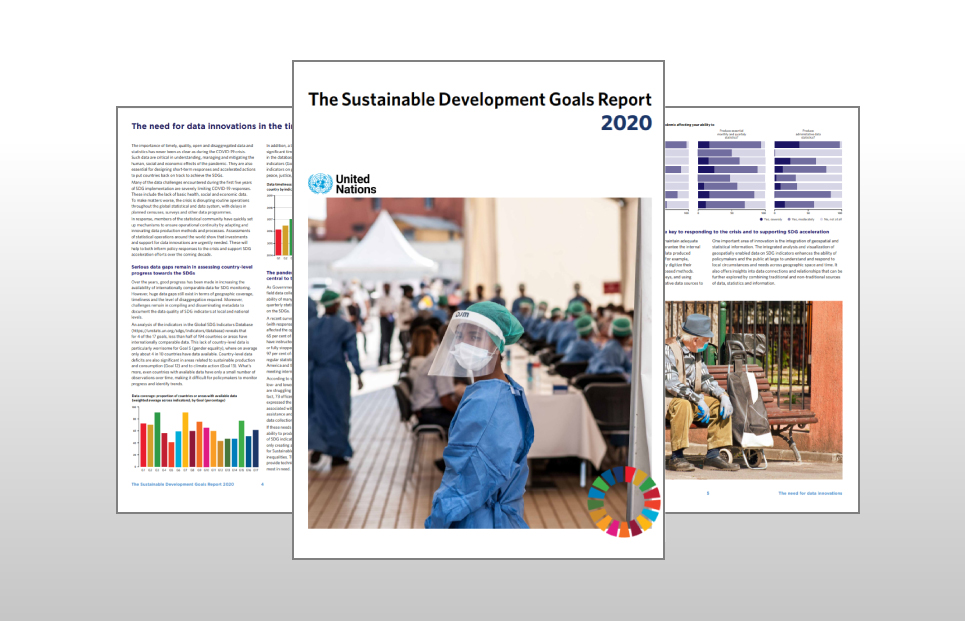
This year marks the start of the Decade of Action to deliver the Sustainable Development Goals (SDG) by 2030. It is a critical period to advance a shared vision and accelerate responses to the world’s gravest challenges. Yet, in only a short period, the spread of COVID-19 turned a public health emergency into one of the worst international crises of our lifetimes, changing the world as we know it. The Sustainable Development Goals Report 2020, released on 7 July, presents an overview of progress towards the SDGs before the pandemic started, but it also looks at some of the devastating initial impacts of COVID-19 on specific goals and targets.
The report points out that eradicating hunger and achieving food security (SDG 2) remains a challenge, especially during the pandemic. At the global level, hunger and food insecurity have been on the rise, and malnutrition still affects millions of children. The situation is likely to get worse due to economic slowdowns and disruptions caused by a pandemic-triggered recession. To mitigate the threats posed by the pandemic to vulnerable populations, countries need to take immediate action to keep trade flowing, to strengthen food supply chains and to increase agricultural production.
The double burden of malnutrition
Eliminating hunger alone will not ensure that everyone has access to sufficient nutritious food. An estimated 26.4% of the global population – about 2 billion people – were affected by moderate or severe food insecurity in 2018, an increase from 23.2% in 2014. People experiencing moderate food insecurity are typically unable to eat a healthy, balanced diet on a regular basis because of income or other resource constraints. Those facing severe food insecurity – about 700 million people – tend to run out of food and, at worst, go a day, or days, without eating. The recent increase in food insecurity was primarily due to worsening situations in sub-Saharan Africa and Latin America.
The incidence of overweight in young children is also on the rise. Childhood overweight is recognized as a global public health problem because of its pernicious influence on the incidence of acute and chronic diseases, healthy development and the economic productivity of individuals and societies. In 2019, 5.6% (or 38 million) of children under age 5 worldwide were overweight. The current global prevalence represents a medium level of severity, signalling that preventative actions are urgently needed for the youngest population.
Overweight and wasting often coexist in a population and are considered the double burden of malnutrition. Find out more about the partnership between the WFP Centre of Excellence against Hunger Brazil, the Brazilian Cooperation Agency (ABC) and the Ministry of Health to tackle the double burden of malnutrition here >>
Smallholder farmers
Smallholder farmers play a critical role in food production worldwide, although they routinely face difficulties accessing land and other productive resources, along with information, financial services, markets and opportunities. Available data show that the share of small-scale producers among all food producers in Africa, Asia and Latin America ranges from 40% to 85%. However, their productivity is systematically lower, on average, than that of larger-scale producers, and in most countries their incomes are less than half of those of their larger counterparts.
The lockdown measures to prevent the spread of the coronavirus have caused businesses and local markets to close, and small-scale food producers are often not allowed to get their products to consumers.
Find out more about how the partnership between the WFP Centre of Excellence, ABC and the Brazilian Cotton Institute (IBA) can contribute to the livelihood of smallholder farmers here >>
About the report
The SDG Report 2020 was prepared by the United Nations Department of Economic and Social Affairs in collaboration with over 200 experts from more than 40 international agencies, using the latest available data and estimates.
The 2030 Agenda for Sustainable Development was launched in 2015 to end poverty and set the world on a path of peace, prosperity and opportunity for all on a healthy planet. The 17 Sustainable Development Goals demand nothing short of a transformation of the financial, economic and political systems that govern our societies today to guarantee the human rights of all.
Click here to download the full report





